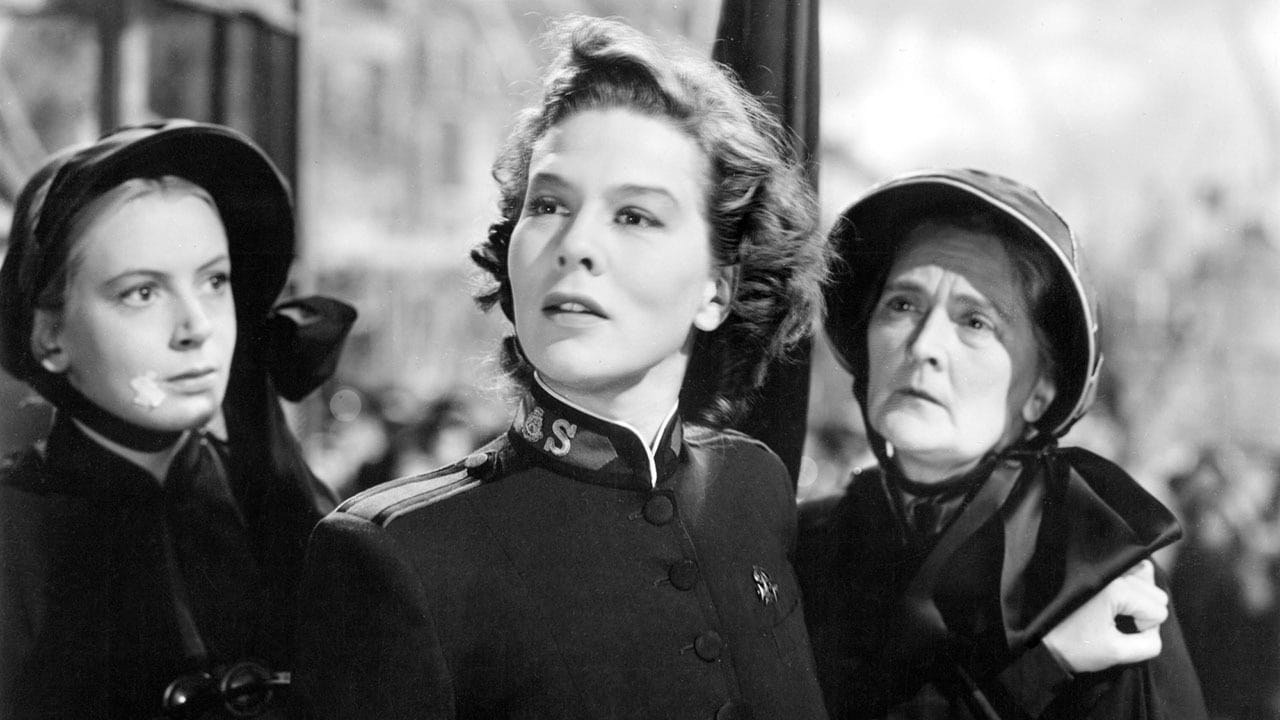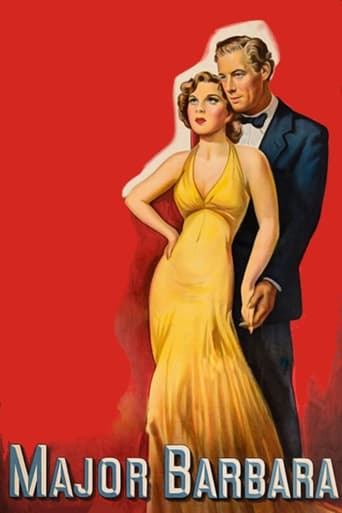ironhorse_iv
There is many of real-life exciting historic stories about the Salvation Army that screenwriters Marjorie Deans and Anatole de Grunwald could had adapted to the big screen, such as the war between them, and the Skeleton Army during the late 19th century, but instead, they chose to brought in, a very preachy and wordy fictional story of battle of wits between Major Barbara (Wendy Hiller) of the Salvation Army versus her father, Andrew Undershaft (Robert Morley), a wealth weapon manufacturer to life. Don't get me wrong, the film does a good job, showing the complexity and struggles of what does it means to save a man's soul. However, this adaptation of author George Bernard Shaw's stage play of the same name is not that entertaining in the sense of providing humor. It doesn't easily provoke laughter like 1913's 'Pygmalion', does, through quick spitting mixer of posh & cockney accents and quirky character development, instead the film's large number of dialogue, slow the film, down to the point that it can make the audience, uneasy & bored, as they wait for the punchline that rarely comes, from the very long rich and detail rants & speeches that are sometimes 1% unrelated to the 99% flight of the masses. It doesn't help that some of the scenes of dialogue were certainly wasn't needed. Did we really need the subplot sequences of Andrew helping out, his other children!? In my opinion, I thought the film should had focus more on Undershaft, putting doubt in Major Barbara's beliefs. Why, because I love the devil's apprentice subplot with Undershaft looking at Greek scholar/Barbara's fiancée Adolphus Cusins (Rex Harrison) as an heir to his business, even if parts of it, doesn't make sense, like the new heir, must be an orphan, because they would be better fit to run a business empire like his. Huh!? Anyways, the reasons, I love his conflict, is because it serves as a great conflict of temptation, for Harrison's character to choose between, a life of righteous or a life of comfortable with Barbara. It adds tension, in a film lacking some. However, the movie spent more time wasting, listening to speeches from Snobby Williams (Emlyn Williams) a minor character, on the virtues of work. Don't get me wrong, Williams does great acting, but couldn't his character be cut or combine with Bill Walker (Robert Newton)? At least, the scenes with Bill Walker seem to play a big part of the main plot with Barbara trying to save his soul. With Snobby Williams. It felt yet, another filler. Another problem with the dialogue sequences is the fact that the English language is little too hard to understand at times, due to the complexity of the meaning of the words, that is being used. Some of the references/slangs/sayings from both the aristocracy and working class, are even dated by 1940s standards. As a modern viewer, it makes the film, a little more challenging, than it has to be. By contrast, more sophisticated forms of humor such as satire require an understanding of its social meaning and context, and thus tend to appeal to a more mature audience. Not for the general audience. There is a number of other factors that prevents, this movie from being a perfect masterpiece. One is the fact that this movie was made during World War 2, in London during The Blitz bombing of 1940. Because of that, the film does feel a bit over-propaganda, in trying it's hardest to make the stubbornness of all pacifists into believing that; the war production is just. Honestly, if this movie was made, during peacetime, where people would be more, likely to think, I would probably, would be less criticize of it, however, since it wasn't. I don't like, Shaw's ideas of pushing accepting dictatorship style capitalism into the public eye, during a time of unrested. Even the way, the movie is shot, director Gabriel Pascal makes the Salvation Army marching in the streets and making speeches in grand halls in quasi-military fashion, look more the dramatics of fascism more than normal corporate social responsibility. Its borderline, disturbing. It's doesn't help, that all the actors, act like they were in a cult, being brainwash into a bigger cult of personality. It's weird, that producer, Gabriel Pascal would chose this play to adapted, in the first place, seeing how Shaw's admirations of Adolf Hitler, Benito Mussolini & Joseph Stalin at the time, were against everything that the United Kingdom, stood for. Thank God, Shaw's optimism on that Machiavelli method of running the country, was quickly shattered by the heinous action of his once highly supported political admirers. By war's end, he was demanding a peace conference, between the nations. Nevertheless, the film still stands on the conflicting message that Mephistophelean capitalism is alright, as long as we approach it with cautious and stick to our beliefs, even if, it's underline our principles, for the greater good. In my opinion, while I have mixed feelings about that, I do felt that it was a strong ending. However, the way, they approach it, was cheap, fake and perplexing. The 'everything will be alright' end to the film was not the right tone. I would rather take the depressing bittersweet approach, to the climax, than what we got here. This was not a happy ending, so it shouldn't be portray like that. Regardless, the acting throughout the movie was amazing, with everybody playing a great part. Mad props goes to Wendy Hiller, Robert Newton and Robert Morley for standing out the most. Also, mad thanks to cinematographer Ronald Neame and his crew on making the movie, look so beautiful. There were so many powerful shots, throughout the film. My favorite has to be, Barbara with the children, looking at the war factory in the distance. Very moving. It's surprising, that they got this film complete on time, with all the air raids. Overall: While, 'Major Barbara' has flaws, its one film worth saving.
robertguttman
One of my all-time favorite films, "Major Barbara" is a cinematic Shavian gem that stands alongside the original "Pygmalion", "Caesar and Cleopatra" and "The Devil's Disciple". Many viewers regard this as a rather verbose comedy-drama but then, as with Plato, dialogue was always what Shaw was all about. And what dialogue! There are more fireworks in ten minutes of "Major Barbara" then can be found in entire movies made nowadays, and without a single explosion or car chase! But then, like all Shaw dramas, this is a story about ideas, not about action. Although Major Barbara (Windy Hiller) is the title character, the real center of the story is her father, munitions tycoon Andrew Undershaft, played brilliantly by a fairly young, and uncharacteristically lean, Robert Morely. It is he who really moves the progress of the story, just as he has controlled the courses of the lives of his family in absentia for the past twenty years without their even being aware of it. As Barbara smugly repudiates his attempts to contribute his tainted money to save her Salvation Army mission, he ironically reminds her fiancée (and the audience) that she has actually accepted a great deal of it already. In fact, she has been living off his tainted money all her life. Tricked out with a Mephistophelean beard (he is constantly referred to as the "Prince of Darkness, and even his name seems redolent of Hell), Undershaft tempts his daughter and prospective son-in-law to abrogate their life in the Salvation Army for his life in the munitions business. Undershaft proposes to spend a day in Barbara's Salvation Army mission if she'll agree to spend a day at his munitions works. She agrees because, in her religious zeal, she's convinced she can convert her father. The worldly Undershaft, on the other hand, is equally sure that he can wean his daughter away from a life he perceives as a waste of her time and talent for one where he feels she can really make a difference. Whether viewers perceive Shaw's story as cynical or realistic depends upon their point of view. Clearly Shaw took the latter view, at least at the time he wrote "Major Barbara". However, perhaps the most remarkable thing about "Major Barbara" is that a film like this should have been produced in Britain at all during the very darkest days of World War II. It is almost impossible to imagine a film such as this being produced in Hollywood at all, let alone during wartime!

